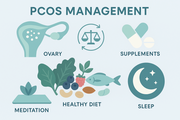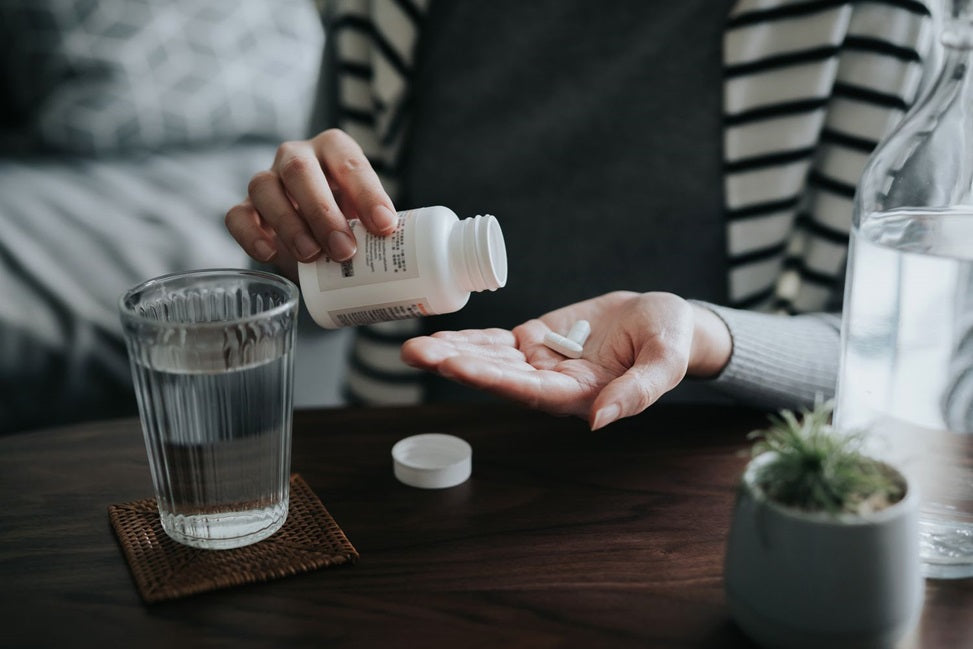
Can You Reverse PCOS Naturally?
Introduction: Taking Control of Your PCOS Journey
Polycystic Ovary Syndrome (PCOS) affects 1 in 10 women of reproductive age worldwide, yet many struggle to find effective solutions beyond conventional treatments. If you're experiencing irregular periods, unexplained weight gain, persistent acne, or struggling with infertility, you're not alone. The empowering truth is that PCOS symptoms can be significantly improved through natural approaches that address the root causes rather than just masking symptoms.
This comprehensive guide reveals evidence-based strategies to help you regain hormonal balance, reduce PCOS symptoms, and improve your overall quality of life naturally. From dietary interventions to targeted supplements, you'll discover practical solutions that thousands of women have used to transform their health.
Understanding PCOS: More Than Just Irregular Menstruation
PCOS is a complex hormonal disorder characterized by insulin resistance, elevated androgen levels, and metabolic dysfunction. Unlike simple irregular menstruation, PCOS creates a cascade of interconnected symptoms that can significantly impact your daily life.
Common PCOS Symptoms You Shouldn't Ignore
The hallmark signs of PCOS extend far beyond abnormal periods:
- Irregular periods or complete absence of menstruation (amenorrhea)
- Painful menstruation when cycles do occur
- Unexplained weight gain, particularly around the midsection
- Persistent acne that doesn't respond to typical treatments
- Facial hair growth (hirsutism) on chin, upper lip, or jawline
- Hair loss or thinning, especially at the crown
- Dark patches of skin (acanthosis nigricans)
- Difficulty conceiving (infertility)
- Severe post menstrual syndrome symptoms
Real-life example: Sarah, a 28-year-old marketing professional, experienced irregular periods for three years before discovering she had PCOS. What she initially dismissed as stress-related menstrual cycle disruptions were actually early warning signs of this complex condition.
The Science Behind Natural PCOS Reversal
Research consistently shows that PCOS treatment doesn't have to rely solely on synthetic hormones or medications. A 2019 study published in the Journal of Clinical Medicine found that lifestyle interventions could improve insulin sensitivity by up to 30% in women with PCOS.
How Insulin Resistance Drives PCOS Symptoms
Insulin resistance is the underlying driver of most PCOS symptoms. When your cells become resistant to insulin, your body produces more insulin to compensate. This excess insulin triggers your ovaries to produce more androgens (male hormones), leading to:
- Disrupted ovulation and irregular menstruation
- Increased facial hair and acne
- Weight gain and difficulty losing weight
- Inflammation throughout the body
Understanding this connection is crucial because addressing insulin resistance naturally can create a domino effect of improvements across all PCOS symptoms.
Evidence-Based PCOS Diet Strategies That Work
Your PCOS diet serves as the foundation for hormonal balance. Research published in Reproductive Biology and Endocrinology demonstrates that specific dietary approaches can reduce PCOS symptoms by up to 50%.
The Anti-Inflammatory PCOS Nutrition Plan
Focus on foods that combat inflammation and support insulin sensitivity:
Prioritize these foods:
- Lean proteins (wild-caught fish, grass-fed meat, legumes)
- Fiber-rich vegetables (spinach, broccoli, Brussels sprouts)
- Anti-inflammatory fats (avocados, olive oil, nuts, seeds)
- Low-glycemic fruits (berries, apples, pears)
- Complex carbohydrates (quinoa, sweet potatoes, oats)
Minimize these inflammatory triggers:
- Refined sugars and processed foods
- Trans fats and vegetable oils
- Dairy products (for some women)
- Gluten-containing grains
- Excessive caffeine
Success story: Maria reduced her painful menstruation and lost 15 pounds in three months by following an anti-inflammatory PCOS diet, proving that food truly can be medicine.
Targeted Supplements for PCOS Management
While diet forms the foundation, specific supplements can accelerate your progress. Research supports several key nutrients for managing PCOS symptoms naturally.
Essential Supplements for Hormonal Balance
Myo-Inositol stands out as one of the most researched supplements for PCOS. Studies show it can improve insulin sensitivity, regulate menstrual cycles, and reduce androgen levels. Learn more about myo-inositol benefits for PCOS and fertility.
Folic Acid plays a crucial role in reproductive health and can help reduce the risk of pregnancy complications in women with PCOS. Discover the importance of folic acid for optimal hormonal function.
Omega-3 fatty acids reduce inflammation and can improve insulin sensitivity by up to 22% according to recent studies.
Vitamin D deficiency affects 65-85% of women with PCOS. Supplementation can improve insulin resistance and support regular ovulation.
For comprehensive PCOS support, consider Sestol PCOS Supplement, which combines these essential nutrients in optimal ratios based on clinical research.
Lifestyle Interventions That Transform PCOS Symptoms
Beyond nutrition and supplements, specific lifestyle changes can dramatically improve your hormonal health and reduce PCOS symptoms.
Exercise Strategies for PCOS Management
The right exercise approach can improve insulin sensitivity, reduce inflammation, and support healthy weight management:
High-Intensity Interval Training (HIIT): 15-20 minutes, 3 times per week can improve insulin sensitivity more effectively than traditional cardio.
Strength Training: Building lean muscle mass enhances glucose uptake and improves metabolic function.
Yoga and Mindful Movement: Reduces cortisol levels and helps manage stress-related PCOS symptoms.
Stress Management for Hormonal Balance
Chronic stress elevates cortisol, which can worsen insulin resistance and disrupt your menstrual cycle. Effective stress management techniques include:
- Daily meditation or deep breathing exercises
- Regular sleep schedule (7-9 hours nightly)
- Stress-reducing activities like journaling or nature walks
- Professional counseling when needed
Clinical insight: Women who implemented comprehensive stress management strategies alongside dietary changes saw 40% greater improvement in PCOS symptoms compared to diet alone.
Sleep and PCOS: The Often-Overlooked Connection
Quality sleep directly impacts hormonal balance and insulin sensitivity. Women with PCOS are 30 times more likely to experience sleep disorders, creating a vicious cycle that worsens symptoms.
Optimizing Sleep for Hormonal Health
Sleep hygiene strategies:
- Maintain consistent bedtime and wake times
- Create a cool, dark sleeping environment
- Avoid screens 2 hours before bedtime
- Consider natural sleep aids like magnesium
- Address sleep apnea if present
Poor sleep quality can increase cortisol and insulin resistance, directly contributing to weight gain, irregular periods, and worsened PCOS symptoms. Prioritizing restorative sleep is not optional—it's essential for natural PCOS management.
Comprehensive PCOS Management with Targeted Products
For women seeking convenient, research-backed solutions, specialized supplement bundles can provide comprehensive support. The Sestol Ultimate Wellness Bundle combines essential nutrients for PCOS management with additional support for overall hormonal health.
Creating Your Personalized PCOS Protocol
Consider these comprehensive options based on your specific needs:
- For beginners: Start with foundational support like Sestol by SOIS Life Sciences
- For comprehensive care: The Sestol Wellness Trio provides multi-faceted support
- For complete hormonal harmony: The Hormonal Harmony Bundle addresses all aspects of PCOS management
Remember, consistency is key. Most women begin seeing improvements in irregular periods and energy levels within 2-3 months of implementing a comprehensive natural approach.
Timeline: What to Expect on Your Natural PCOS Journey
Understanding realistic timelines helps maintain motivation and track progress effectively.
Month-by-Month Progress Expectations
Month 1-2: Improved energy levels, better sleep quality, reduced sugar cravings Month 3-4: More regular menstrual cycles, reduced acne, initial weight loss Month 5-6: Significant improvement in insulin resistance, reduced facial hair growth Month 7-12: Stabilized hormones, regular ovulation, improved fertility markers
Important note: Every woman's journey is unique. Some may see improvements sooner, while others may need additional time. Patience and consistency are crucial for long-term success.
FAQs: Your Most Common PCOS Questions Answered
Q: Can PCOS be completely cured naturally? A: While PCOS cannot be "cured," its symptoms can be significantly managed and often reversed through natural approaches. Many women achieve complete symptom resolution with consistent lifestyle interventions.
Q: How long does it take to see improvements in irregular periods? A: Most women notice improvements in menstrual cycle regularity within 3-6 months of implementing comprehensive natural treatments. Painful menstruation often improves sooner, sometimes within the first cycle.
Q: Will natural treatments help with PCOS-related infertility? A: Yes, natural approaches that improve insulin sensitivity and reduce inflammation can significantly enhance fertility. Many women conceive naturally after addressing underlying PCOS causes.
Q: Can I reverse PCOS symptoms without medication? A: Many women successfully manage PCOS symptoms through diet, lifestyle changes, and targeted supplements alone. However, work with healthcare providers to determine the best approach for your specific situation.
Q: What's the most important factor in natural PCOS treatment? A: Addressing insulin resistance through diet and lifestyle changes forms the foundation of successful natural PCOS management. All other interventions work more effectively when insulin sensitivity is improved.
Q: How do I know if my natural PCOS treatment is working? A: Track improvements in irregular periods, energy levels, weight management, acne, and overall well-being. Lab tests can confirm improvements in insulin sensitivity and hormone levels.
Conclusion: Your Path to Natural PCOS Recovery Starts Today
Reversing PCOS naturally is not only possible—it's empowering. By addressing the root causes of insulin resistance and hormonal imbalance, you can transform your health and reclaim your vitality. The combination of an anti-inflammatory PCOS diet, targeted supplements, stress management, and quality sleep creates a powerful foundation for healing.
Remember, small consistent changes compound into significant transformations. Whether you're dealing with irregular periods, weight gain, acne, or fertility challenges, natural solutions offer hope and lasting results.
Take action today: Start with one or two strategies from this guide and gradually build your comprehensive PCOS management protocol. Your journey to hormonal balance and vibrant health begins with the next choice you make.
Ready to begin your transformation? Explore our comprehensive PCOS support products designed to support your natural healing journey.
References
-
Teede, H. J., et al. (2019). "Recommendations from the international evidence-based guideline for the assessment and management of polycystic ovary syndrome." Journal of Clinical Medicine, 8(9), 1468.
-
Moran, L. J., et al. (2013). "Dietary composition in restoring reproductive and metabolic physiology in overweight women with polycystic ovary syndrome." Journal of Clinical Endocrinology & Metabolism, 98(11), 4845-4851.
-
Papavasiliou, K., et al. (2019). "The role of myo-inositol in insulin resistance and polycystic ovary syndrome." European Review for Medical and Pharmacological Sciences, 23(22), 9968-9974.
-
Barrea, L., et al. (2018). "Nutrition and polycystic ovary syndrome: dietary supplements as a therapeutic strategy." Reproductive Biology and Endocrinology, 16(1), 94.
-
Harrison, C. L., et al. (2011). "Exercise therapy in polycystic ovary syndrome: a systematic review." Human Reproduction Update, 17(2), 171-183.
-
Moran, L. J., et al. (2011). "Sleep disturbances in a community-based sample of women with polycystic ovary syndrome." Human Reproduction, 26(9), 2428-2435.




















